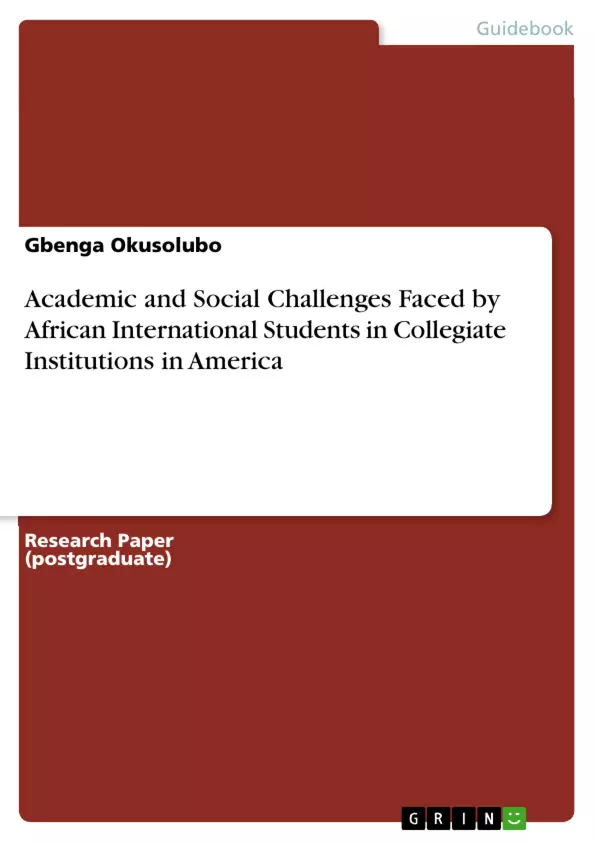International students’ enrollment in higher education in the U.S has expanded considerably in the last decades. In 2015, the United States hosted more of the world’s 4.1 million international students than any other country. With the number of foreign students that come to study in the U.S, 14.5% of international students are African students with the majority of the population coming from Nigeria, Kenya, and Ghana.
The U.S. is often described as the land of opportunity abroad, but this research intends to explore that perception for international students, especially African students. Many consider African international students as the gateway to local business owners in the U.S seeking to expand a wider global horizon, especially in Africa.
This research explored the different types of academic and social challenges faced by African international students in collegiate institutions in America through auto-ethnographic research, and to find possible solutions to those challenges faced by African students. This is a qualitative research approach that used the sequential auto-ethnographic experience of the author as the research tool in identifying and categorizing some of the challenges faced by African international students. It is the researcher’s intention that the findings in this research will be used as a guide for the next group of African international students aspiring to come to the U.S to study.
Inhaltsverzeichnis (Table of Contents)
- Chapter 1: Definition of the Problem...
- Chapter 2: Literature Review.
- Chapter 3: Methodology
- Participant Observation.
- Chapter 4: Data Analysis and Interpretation........
- Immigration and Visa........
- Academic Requirements and Expectations..
- Financial Pressure
- Language....
- Climatic Change and Living Condition.
- Teaching-learning culture.
- Social Challenges..
- Stereotyping and Segregation
- Racial discrimination
- Separation and Detachment
- Politics and Policies
- Chapter 5: Summary, Conclusion and Recommendation
- Family pressure and Transitioning process.
- Financial Problem
- Cultural Difference
- Recommendation.
Zielsetzung und Themenschwerpunkte (Objectives and Key Themes)
This capstone project examines the academic and social challenges faced by African international students in collegiate institutions in the United States. Using an auto-ethnographic approach, the research aims to identify and categorize these challenges based on the author's own experiences as an African international student. The research hopes to provide insights and solutions to help future African international students navigate their academic and social experiences in the U.S. Key themes explored in this research include:- Immigration and Visa issues
- Academic Expectations and Requirements
- Financial Pressures
- Cultural Differences and Social Challenges
- Language Barriers
Zusammenfassung der Kapitel (Chapter Summaries)
Chapter 1 provides a definition of the problem, highlighting the increasing number of African international students in the U.S. and the need to understand their experiences. Chapter 2 offers a literature review on existing research regarding the challenges faced by international students in general and African students in particular. Chapter 3 outlines the methodology employed in the research, focusing on the use of auto-ethnography. Chapter 4 delves into the data analysis and interpretation of the author's experiences, exploring various challenges faced by African international students, including those related to immigration, academic requirements, financial pressure, language, climate, teaching-learning culture, and social issues like stereotyping, racial discrimination, separation, and political factors.
Schlüsselwörter (Keywords)
This research focuses on the experiences of African international students in U.S. collegiate institutions, exploring key themes such as immigration, academic expectations, financial pressures, cultural differences, language barriers, and social challenges.Frequently Asked Questions
What is the main objective of this research?
The research explores the academic and social challenges faced by African international students in U.S. collegiate institutions and seeks to find possible solutions.
What methodology was used in this study?
The study uses a qualitative approach, specifically sequential auto-ethnographic research based on the author's own experiences.
Which African countries represent the majority of international students in the U.S.?
According to the abstract, the majority of the African student population comes from Nigeria, Kenya, and Ghana.
What are some of the academic challenges identified?
Key academic challenges include meeting academic requirements and expectations, language barriers, and adapting to a different teaching-learning culture.
What social challenges do African international students face?
The research highlights issues such as stereotyping, segregation, racial discrimination, and the feeling of separation or detachment.
Are there other practical difficulties mentioned in the research?
Yes, the study also addresses immigration and visa issues, financial pressure, and adjustments to climatic changes and living conditions.
- Quote paper
- Gbenga Okusolubo (Author), 2017, Academic and Social Challenges Faced by African International Students in Collegiate Institutions in America, Munich, GRIN Verlag, https://www.grin.com/document/416225



